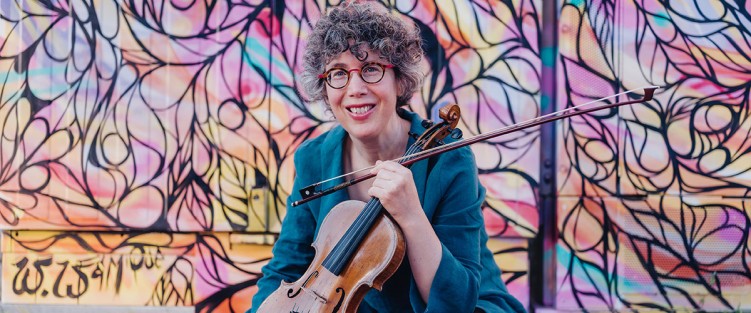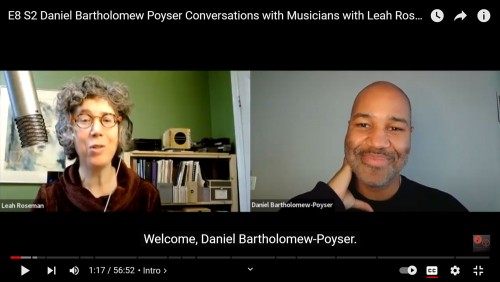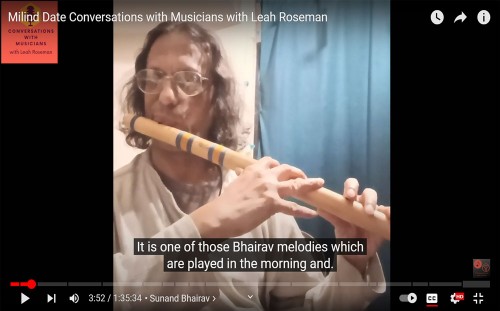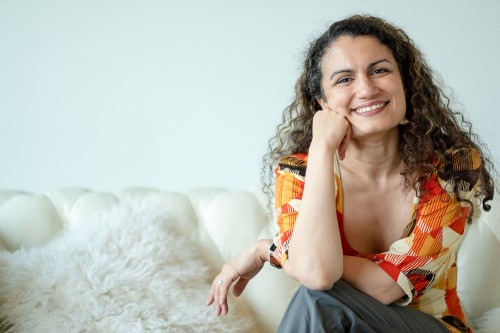 Life the way most working musicians across the spectrum knew it came to a standstill in March 2020. For Leah Roseman, a violinist with the National Arts Centre Orchestra (NACO) since 1997, the effect was immediate, manifesting itself from day one as “a need to engage with people and help.” Finding herself teaching online for the first time, she began recording videos of herself playing etudes, scales, orchestral excerpts, and offering tips about learning violin for her students. “I was just going to put them in some Dropbox file, but I thought ‘Well, I could just put them on a [private] YouTube channel.’ And then I thought if I made it public maybe people would stumble upon it.” And stumble upon it they did. Ultimately, Roseman created over 1,000 videos on her YouTube channel, attracting over 400,000 views, and laying the groundwork for her path to what I call “other-level pivoting.”
Life the way most working musicians across the spectrum knew it came to a standstill in March 2020. For Leah Roseman, a violinist with the National Arts Centre Orchestra (NACO) since 1997, the effect was immediate, manifesting itself from day one as “a need to engage with people and help.” Finding herself teaching online for the first time, she began recording videos of herself playing etudes, scales, orchestral excerpts, and offering tips about learning violin for her students. “I was just going to put them in some Dropbox file, but I thought ‘Well, I could just put them on a [private] YouTube channel.’ And then I thought if I made it public maybe people would stumble upon it.” And stumble upon it they did. Ultimately, Roseman created over 1,000 videos on her YouTube channel, attracting over 400,000 views, and laying the groundwork for her path to what I call “other-level pivoting.”
The idea of talking to people and recording the conversations followed about a year later, as Roseman started to acquire a bit of a social media following. “It was May 2021, I believe, when I started …there was another lockdown and the feeling of isolation was pretty profound.” She credits her brother for strongly encouraging her to consider podcasting: “‘Don’t just put a video up,’ he said. ‘I don’t want to have to watch anything. Make it a podcast.’ And I said, ‘Well, I don’t know how to do that.’ He said, ‘Well, figure it out.’” She did, and Conversations with Musicians with Leah Roseman was born.
A podcast lover for many years, Roseman admits to “a very deeply buried dream” of hosting a podcast of her own, and says it was fun to realize that she could “just put a podcast out there.” Of course, as she discovered, the nuts and bolts of the operation involved a lot more than just “putting it out there”: equipment upgrades; creating an appealing, easily navigable website; contacting and securing her guests (now numbering close to 100); impressively in-depth research into her guests; preparing intros; developing and honing both her editing skills and her gracious interviewing style; introducing merch (albeit for a limited time); painstakingly preparing transcripts and timestamps; promoting the podcast; fundraising; and, finally, factoring in the enormous time commitment. Other-level pivoting, indeed!
Conversations with Musicians with Leah Roseman (CwM) features a remarkable array of musicians from around the globe, sharing their unique and fascinating stories with Roseman. In wonderfully candid episodes, animated by Roseman’s endless curiosity, topics run the gamut: personal and professional challenges; stepping outside one’s comfort zone; critical career moves, roads not taken and life before and beyond music; practice regimes, inspiring books, memorable mentors and survival techniques. And to top it all off, the great music that guests share and play during the sessions. What remains when the hour-plus interviews come to an end is a wealth of insight into what it takes to build and maintain a well-lived, creative, meaningful life.
Seasons 1, 2 and 3: Since Roseman had an already built-in audience of violinists, Season 1 featured a number of mostly Canadian-based musicians who play the violin and all kinds of bowed instruments, including her inaugural guest, nyckelharpa player Kirsty Money, NACO concertmaster Yosuke Kawasaki (episode 3), world-renowned violinist James Ehnes (episode 11), erhu player Patty Chan (episode 4) and Carnatic violinist Subhadra Vijaykumar (episode 14). And those are just five of the 20 Season 1 guests!
In Seasons 2 and 3 (S2 and S3), with 30 and 41 guests respectively, Roseman ranges “all over the map” (literally), engaging musicians from over 20 countries, playing all kinds of instruments. Her choice of guests reveals both a taste for the eclectic, and a true music lover, who by her own admission, is both a little bit impulsive and also a planner. “So, I think both of those things come into play,” she says, “and I always try to leave room for following my own curiosity.” In one case, she says, “I really wanted to talk to a gadulka [traditional Bulgarian bowed string instrument] player, so I searched ‘gadulka players in Bulgaria’. I also had this Bulgarian connection here, which made that interview easier to do.” The gadulka player? Bulgarian virtuoso Hristina Beleva (S2, episode 24).
Similarly, Roseman had a strong desire to talk to a bansuri player, and through her Google search, found bansuri master, Milind Date (S3, episode 14), who joined her from his home in Pune, India. “I just reached out to him through his website … we had a conversation and it led to that interview.” And why was she specifically looking to speak to a player of this ancient side-blown flute originating from India and Nepal? “Well, I love music from all over the world. Part of what I do is talk to people from different traditional backgrounds. And I listen to South Asian music … it’s just part of what I am interested in.”
What I gleaned from my “travels” through CwM is that Roseman’s interests, as revealed in interviews with instrumentalists, vocalists, composers, arrangers, conductors, producers and instrument builders, also extend to jazz, klezmer, traditional Québécois fiddle music, blues, Yiddish, Icelandic, Irish, improvised and folk music, Mongolian overtone throat singing, and music performed on the accordion, harp, harmonica, handpan, kora, koto, banjo, Cretan lyra and Iranian kamancheh. She delights in drawing out her guests’ “other lives,” past and present, as community builders, psychoanalysts, entrepreneurs, educators, music therapists, yoga teachers, authors, dancers, Rhodes scholars with PhDs in Applied Physics, astronomy professors and environmental science policy wonks.
That spectacularly diverse list – and I’ve just scratched the surface here – gives you an idea of who (and what) you might encounter in any given interview as you explore CwM’s incredible catalogue. For instance, those last four “other life” endeavours I mentioned – dancer, Rhodes Scholar, professor and policy wonk – all pertain to one person – Ottawa-based jazz singer, ukulele teacher and composer, Diane Nalini (S2, episode 12), who still does some work for Environment and Climate Change Canada. Nalini also performs in four languages, has dabbled in Chinese calligraphy, learned German (a fifth language) to better sing Schubert Lieder, and has written songs inspired by great literature (including Shakespeare), in jazz, blues, gospel, folk and bossa nova styles. One example of the kind of crazy-talented, super-creative people Roseman introduces us to, in episode after episode. And when I say “us,” I’m referring to CwM listeners/viewers, aged 18 to 65-plus (according to stats she gets from Spotify) who are tuning in from over 85 countries!
“I try consciously to show there’s many different paths in music,” Roseman says, emphasizing at the same time that her series encompasses universal themes and is not simply for musicians. “It’s a ‘society and culture’ podcast in my mind,” she says. Her social media followers agree.
With pandemic lockdowns a thing of the past (for now), and live music performance back on track, what does the future hold for this singular society-and-culture podcast? “I worry a little bit about burnout,” Roseman concedes. “But I think I’m managing. I mean, I get so much energy from every conversation I have, and I enjoy all the aspects. So as long as my health is fine, I think I can manage it. So, I see this as being very long term … I picture myself as an extremely old woman doing this. This is my plan.”
My own plan is to grab a glass of wine and tuck into the brand new episodes of Season 4, which Roseman just launched on January 6, 2024. I already know I’m in for a treat!
Check out Roseman's website, featuring links to her podcast and YouTube channel!
Concert Notes
Here's a partial list of CwM guests performing live in February/March 2024, in Toronto (unless otherwise indicated):
Michael Bridge, accordion (S3 E40): Feb 1 – Isabel Bader Centre for the Performing Arts, Kingston; Feb 3 – Walter Hall; Feb 4 - Bethel Community Church, Barrie
Raphael Weinroth-Browne, cello (S2 E22): Feb 2 – Drom Taberna; Mar 21 – Burdock Music Hall
Daniel Bartholomew-Poyser, conductor (S2 E8): Feb 11 and 14 – Roy Thomson Hall (TSO Young People’s Concert)
J. Walter Hawkes, trombone (S4 E2): Feb 14 – Koerner Hall (The Hot Sardines)
Colleen Allen, saxophone (S3 E6): Feb 15 – Canadian Music Centre (Jazz at the Centre); Feb 24 – Jazz Bistro (Kalabash)
Peter Hum, piano (S3 E43): Feb 18 and 19 – The Rex (Peter Hum’s Comet Quartet)
National Arts Centre Orchestra (incl. Leah Roseman and NACO colleagues who were CwM guests): Mar 2 – Roy Thomson Hall
Patty Chan, erhu (S1 E4): Mar 8 – Hart House (Toronto Chinese Orchestra)
Marilyn Lerner, piano (S2 E25): Mar 24 – Revue Cinema (live improvised accompaniment to silent film)
Aaron Schwebel, violin (S1 E10): Mar 28 – Koerner Hall (Esprit Orchestra)
Rachel Mercer, cello (S2 E9): Mar 29 – Keffer Memorial Chapel, WLU, Waterloo (Kitchener-Waterloo Chamber Music Society)
Sharna Searle trained as a musician and lawyer, practised a lot more piano than law and currently works as a freelance writer, editor and proofreader.






